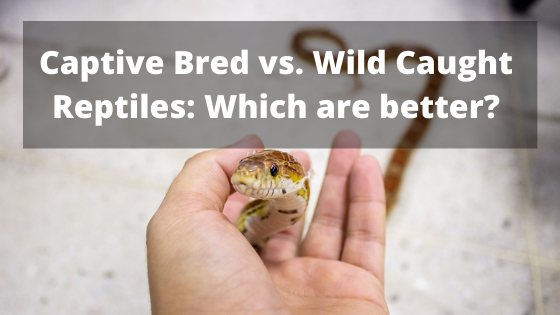There are two main sources of pet reptiles: wild caught reptiles and captive bred reptiles. Wild caught reptiles are defined as those that were born in their native environment to non-captive parents, then taken into captivity. Captive bred reptiles are those that are born in captivity to captive bred parents. This is also known as “domestically bred.” Though many people own wild caught reptiles, it is much better to purchase captive bred reptiles for a variety of reasons.
General Health
Overall, captive bred reptiles are significantly healthier animals that can have normal life spans with proper care. They aren’t subjected to the enormous stress that wild caught reptiles are, and they are able to more easily resist or fight off disease and infection. Wild caught reptiles must deal not only with being captured and transported, but also with adjusting to a captive lifestyle. Prolonged stress causes very serious health issues in reptiles, and it is estimated that up to 90% of wild caught reptiles will succumb to stress-related illnesses within the first year of captivity.
Parasites
Wild caught reptiles also carry heavier parasite loads. Parasites that are present in native environments often have little effect on reptiles because they live in a natural balance with their hosts. However, you take a wild reptile, put him in a captive environment, and previously harmless parasites can become very deadly as they multiply past safe levels. Wild caught reptiles can also pass on parasites to any other reptiles you may own, and it’s highly likely that captive bred reptiles will have no immunity to a wild caught reptile’s parasites.
Known History
With a captive bred reptile, you know what you are getting, and the breeder is available to answer any questions you may have. You will know how old the reptile is and what his specific needs are. Captive bred reptiles are carefully bred and raised with proper nutrition and housing. The breeder is aware of what diseases, parasites, and living conditions their reptiles have been exposed to. Captive bred reptiles are also much more likely to accept pre-killed prey readily.
With wild caught reptiles, there are no such guarantees. Their history is largely unknown, and you don’t know what diseases or parasites they are carrying. They may never have seen pre-killed prey, and they could very well be dealing with a serious illness that is not yet apparent.
Legal & Ethical Issues
There are also legal and ethical issues associated with the capture and sale of wild caught animals. In many places, it is illegal to remove reptiles from their natural habitat, and those who do it need a permit. However, many don’t bother to get one and, in addition to being harmful, their actions are also criminal.
We call their actions “harmful” because harvesting wild reptiles has a serious effect on the natural environment. It decimates reptile populations, especially those that take a long time to mature to a breeding age, because the number removed exceeds the reproductive capacity of the population. The methods used to collect wild caught reptiles can also destroy dens and other natural habitats. Wild reptile collection is one of the top reasons that reptile and amphibian populations around the world are declining alarmingly.
Cost
Though captive bred reptiles are generally more expensive initially, the investment is well worth it. You will pay more at the time of purchase, but you will most likely pay less in the long run than if you purchased a wild caught reptile that almost always requires expensive veterinary care. If the reptile does die, you will then end up spending more money to replace it. Purchasing a captive bred reptile to start with eliminates these financial issues.
In Summary
By purchasing a captive bred reptile, you are getting a healthier animal, you are helping to protect native reptile populations, and you are not supporting the unethical practice of reptile harvesting. Not all reptiles are available as captive bred, but we urge you to purchase only captive bred whenever possible. Whenever you purchase a reptile from a pet store, always ask where the reptile came from. By refusing to purchase wild caught reptiles and urging others to only purchase captive bred reptiles, you can make a difference.
